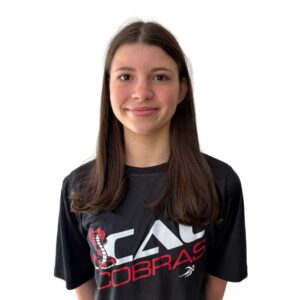Why CAL Spots Academy Coaches makes the difference.

Coaching with Love
Q. Can you share your coaching philosophy and experience?
A. My coaching philosophy is formed by a growth mindset, where players are encouraged to try new things, take on challenges and learn new things from every new experience. I want to create a positive, encouraging and supporting environment that stresses the importance of working hard and working together.
Q. How did you get started in volleyball coaching?
A. I got started coaching volleyball when my high school coach asked me to come back over the summer to help work with the girls.
Q. What inspired you to coach at Cal Sports Academy?
A. While looking for a job in college I knew I wanted to do something that would give me experience with kids since I am an education major. My roommate, Marley told me about how much fun she had coaching at CAL and encouraged me to apply there.
Coaching Style and Strategies
Q. What’s your approach to teaching volleyball fundamentals?
A. My approach to teaching volleyball fundamentals is built around encouragement. While critiquing a player I like to walk them through the drill or skill and have them do it with me, so they get a feel for it before doing the real thing. Also, if I can see a player getting frustrated with themselves when I give them a tip, I like to throw in something that they are doing well so they can also focus on that too.
Q. How do you motivate players to improve?
A. I motivate players to improve by giving them goals to reach as a team and also personally. I also want players to motivate each other and support each other since volleyball is a huge team sport.
Q. What strategies do you use to prepare teams for competition?
A. To prepare teams for competitions, I would end the practice the day before on a good note so that they can be left off feeling confident in their personal abilities and their ability to work together. This is something that always helped me go into the game or tournament with a good and positive mindset.
Player Development
Q. How do you assess player strengths and weaknesses?
A. To assess a player’s strength’s vs weaknesses I look at their attitude mostly, when a player is frustrated or doesn’t look forward to a specific drill (i.e., serving) odds are they will struggle with it, so I like to keep a specific eye on them during said activity. I also look to see how that player’s skills are compared to the rest of the team and their peers to see if they excel or need some guidance with that skill.
Q. What drills and exercises do you use for skill development?
A. For skill development I like to do partner work such as peppering, triple touch peppering, passing with a target and setting back and forth so they can focus on ball control and that way I can also focus more on one person at a time to help critique them.
Q. How do you foster teamwork and communication?
A. To foster teamwork and communication I would like to have an open discussion with the team to see what would help them. I had a coach who let our team talk about things that would help us and it was the best team I have ever played on. I think letting the players talk among themselves about how to encourage communication between themselves is crucial. It is also important for the coach to listen to feedback so they can help encourage teamwork between them as well.
Game-Day Preparation
Q. How do you prepare your team for matches?
A. To prepare a team for matches, I like to practice the lineup beforehand so they know what to expect and to leave practice off on a good note the day before so they can carry confidence with them into the match day.
Q. What’s your approach to in-game adjustments?
A. My approach to game adjustments is to have players who are utility players and to train everyone to play in every position if needed. (i.e., libbers will hit sometimes in practice, hitters will work in the back row) This way whenever something comes up, players are prepared and hopefully feel comfortable in every position.
Q. How do you manage player substitutions and rotations?
A. Managing player substations and rotations is about looking at the needs of the team and also at the development of players. It is about who shows the most effort and gives it their all while having the skills needed to be on the court. It can be hard if a player lacks skills in specific areas but at the end of the day, in high stake situations, it is about the needs of the team and what will help the team. But communicating with players who may not get the same playing time as others is also important to maintain their self-confidence.
Cal Sports Academy Specific
Q. What drew you to Cal Sports Academy?
A. I was drawn to CAL Sports by Marley and my coach Lauren. They both talked very highly of the program and Corey, and I knew I wanted to be a part of that. I love teaching kids about the sport I love, and I want to help grow players’ love for volleyball.
Q. How do you incorporate the academy’s values into your coaching?
A. I incorporate CAL values by committing to helping young players grow a love and an IQ for volleyball, helping them build determination, motivation and strength to be a hardworking and driven player. And lastly, I want to incorporate teamwork into everything by encouraging them to talk among themselves and each other during team huddles and drills to help them work together.
Q. What goals do you have for the volleyball program?
A. Some goals that I have for the volleyball program is for every player to walk out of practice every day knowing they learned something new and had a lot of fun that day.
Q. What advice would you offer to anyone wanting to play volleyball?
A. Some advice I would offer to anyone who wants to play volleyball is to never give up and to not let a bad day ruin the love for the sport. Every athlete has bad practices and games and how a player handles that is crucial to how the player is individually and as a teammate. Volleyball is a mental sport and in order to succeed you have to be able to shake off any mistakes. It is too fun of a sport to let a bad practice or day ruin it.
Q. What changes would you like to see in the game of volleyball?
A. N/A
Fun Questions
Q. Favorite volleyball memory?
A. My favorite volleyball memory is winning Gold at a tournament with my club team my junior year.
Q. Most influential coach or mentor?
A. My most influential coach was my junior year club coach. She created the perfect environment for a team to thrive and drove me to be the best player I can be. She believed in me, which made me believe in myself. I grew so much as a player that season because of her and she is the reason I am playing college volleyball and the reason I want to be a coach.
Q. Advice for young volleyball players?
A. My advice for young volleyball players is to have fun with it and to learn a lot. Starting young is the most important thing in a sport. Take it seriously but don’t take it too seriously. Have fun is the most important way to succeed in volleyball because it drives you to want to learn more and be the best you can be.
